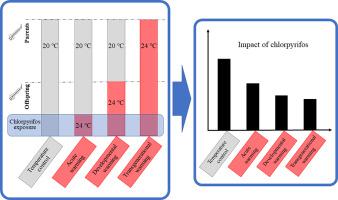Science of the Total Environment ( IF 8.2 ) Pub Date : 2021-09-16 , DOI: 10.1016/j.scitotenv.2021.150373 Shandong Meng 1 , Tam T Tran 2 , Khuong Van Dinh 3 , Vienna Delnat 1 , Robby Stoks 1

|
There is increasing awareness that the toxicity of pesticides can to a large extent be modulated by warming, and that temporal exposure scenarios may strongly affect the impact of two stressors. Nevertheless, we lack information on how the exposure duration to warming may shape pesticide toxicity under warming. Furthermore, despite that bioenergetic responses have the potential to generate mechanistic insights in how toxicants interact with warming, this has been understudied in ecotoxicology. To investigate whether warming duration modifies pesticide toxicity, mosquito larvae were exposed to a control temperature at 20 °C or three warming treatments at 24 °C (acute, developmental and transgenerational warming), and to four pesticide treatments (solvent control, and three chlorpyrifos concentrations) in a full factorial design. Chlorpyrifos increased mortality, growth rate and the energy consumed, and reduced the AChE (acetylcholinesterase) activity, the energy available, and the net energy budget (estimated as cellular energy allocation). The warming treatments did not affect mortality, AChE activity, and the energy consumed. However, acute warming increased the growth rate and decreased the energy available, while both acute and developmental warming decreased the cellular energy allocation. A first key finding was that the lethal and sublethal effects of chlorpyrifos were less strong under warming because of a higher degradation in the medium under warming. A second key finding was that, among the warming treatments, the pesticide toxicity was more increased under acute warming than under transgenerational warming. This could be explained by the negative impact of acute warming but not transgenerational warming on the net energy budget. The results in this study provide mechanistic insights that the exposure duration to warming can play an important role in modulating the impact of pesticides under warming. Therefore, including ecologically relevant temporal scenarios of exposure to warming is important in ecotoxicological studies.
中文翻译:

通过减少能量收支,急性变暖比跨代变暖更能增加农药毒性
人们越来越意识到农药的毒性在很大程度上可以通过变暖来调节,并且时间暴露情景可能会强烈影响两种压力源的影响。然而,我们缺乏关于暴露于变暖的持续时间如何影响变暖下农药毒性的信息。此外,尽管生物能反应有可能产生关于毒物如何与变暖相互作用的机械见解,但这在生态毒理学中尚未得到充分研究。为了研究升温时间是否会改变农药毒性,蚊子幼虫暴露于 20 °C 的控制温度或 24 °C 的三种升温处理(急性、发育和跨代升温),以及四种农药处理(溶剂控制和三种毒死蜱)浓度)在全因子设计中。毒死蜱增加死亡率、增长率和消耗的能量,并降低 AChE(乙酰胆碱酯酶)活性、可用能量和净能量预算(估计为细胞能量分配)。加温处理不影响死亡率、AChE 活性和消耗的能量。然而,急性变暖会增加增长率并减少可用能量,而急性变暖和发育性变暖都会降低细胞能量分配。第一个关键发现是毒死蜱的致死和亚致死作用在变暖下不那么强烈,因为在变暖下培养基中降解程度更高。第二个重要发现是,在加温处理中,与跨代加温相比,急性加温下农药毒性增加更多。这可以通过急性变暖而不是跨代变暖对净能源预算的负面影响来解释。这项研究的结果提供了机械见解,即暴露于变暖的持续时间可以在调节杀虫剂在变暖下的影响方面发挥重要作用。因此,包括暴露于变暖的生态相关时间情景在生态毒理学研究中很重要。











































 京公网安备 11010802027423号
京公网安备 11010802027423号